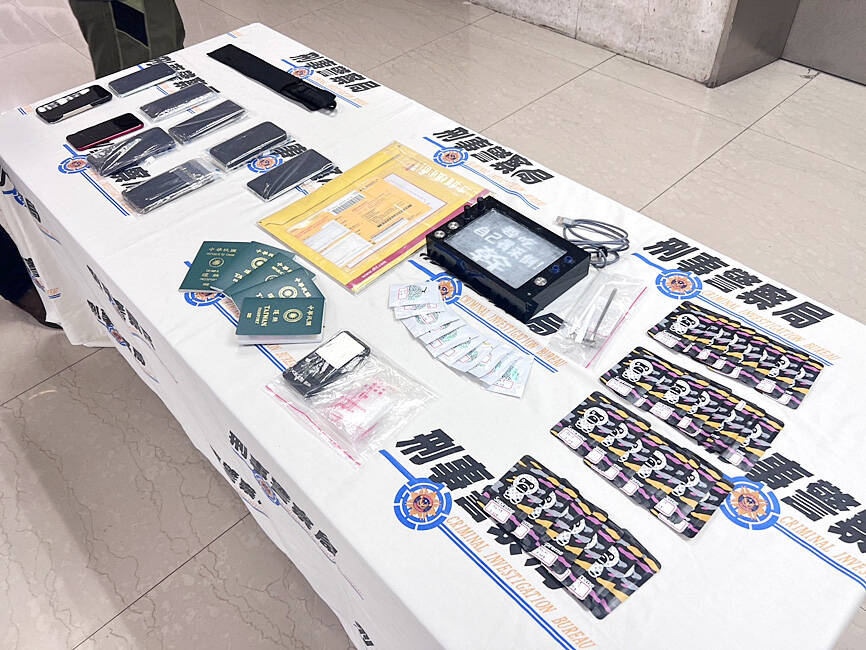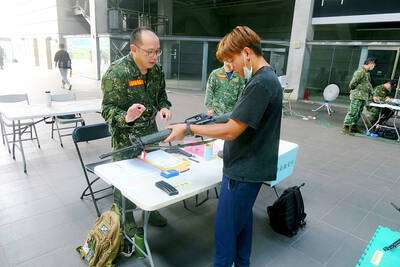The Criminal Investigation Bureau (CIB) has discovered an alleged passport forgery ring based in Taiwan that sold Taiwanese passports for use by Chinese nationals so that they could enter European countries.
The operation in Taiwan was allegedly headed by Zheng Zijuan (鄭子娟), aged 56, a Chinese national who was previously married to a Taiwanese before later divorcing, and is now married to a Chinese man, surnamed He (何). She had three Taiwanese working for her, and the five Taiwanese who allegedly sold the passports were indicted by the Yilan District Prosecutors’ Office yesterday.
The indictment said that the illegal sale of passports “detrimentally affects Taiwan’s national security and international image, and was likely part of a Chinese criminal ring involved in illegal international human smuggling into European countries.”

Photo copied by Chiu Chun-fu, Taipei Times
Along with contravening the Passport Act (護照條例), the 10 suspects were also charged with colluding with organized criminal groups in China, and with contravening the Organized Crime Prevention Act (組織犯罪防制條例) with systematic plans to solicit multiple forged passports, as part of a sophisticated human smuggling operation on a major international scale, the indictment said.
“We were contacted by law-enformcent agencies in Europe after they uncovered many Chinese nationals entering and exiting across borders using Republic of China (ROC) passports. The total has been verified at about 50 passports,” CIB International Criminal Affairs Division official Yang Kuo-sung (楊國松) said.
The investigation found that about 20 Chinese nationals used 50 forged passports, with only one of them being arrested in Spain, while efforts are ongoing to track down the others, Yang said.
Zheng, who lives in Yilan County, divorced her Taiwanese husband soon after she obtained citizenship, and was working as a hostess in bars in Yilan. She linked up with a criminal ring based in her native Fuzhou in China’s Fujian Province, who paid her money to solicit Taiwanese willing to sell their passports, Yang said.
The investigation found that Zheng allegedly posted adverts on social media, offering prices of between NT$7,000 and NT$10,000 for each passport. She took pictures of the passports and sent it to the criminal gangs in China to find a rough match, such as similar age and facial features, investigators said.
The passports were sent by courier to accomplices who had set up bases in European countries, including in Italy, Spain and Greece, from where they would sell the passports for 30 times the price to Chinese nationals so that they could get into Europe, Yang said.
He said that Chinese criminal rings target ROC passports, as holders of ROC passports can receive visa-free entry to more than 110 countries, many more than Chinese passport holders, who only have visa-free entry to about 40 countries, of which most are not in Europe and North America, the most desired regions.

A magnitude 6.4 earthquake struck off the coast of Hualien County in eastern Taiwan at 7pm yesterday, the Central Weather Administration (CWA) said. The epicenter of the temblor was at sea, about 69.9km south of Hualien County Hall, at a depth of 30.9km, it said. There were no immediate reports of damage resulting from the quake. The earthquake’s intensity, which gauges the actual effect of a temblor, was highest in Taitung County’s Changbin Township (長濱), where it measured 5 on Taiwan’s seven-tier intensity scale. The quake also measured an intensity of 4 in Hualien, Nantou, Chiayi, Yunlin, Changhua and Miaoli counties, as well as

Credit departments of farmers’ and fishers’ associations blocked a total of more than NT$180 million (US$6.01 million) from being lost to scams last year, National Police Agency (NPA) data showed. The Agricultural Finance Agency (AFA) said last week that staff of farmers’ and fishers’ associations’ credit departments are required to implement fraud prevention measures when they serve clients at the counter. They would ask clients about personal financial management activities whenever they suspect there might be a fraud situation, and would immediately report the incident to local authorities, which would send police officers to the site to help, it said. NPA data showed

ENERGY RESILIENCE: Although Alaska is open for investments, Taiwan is sourcing its gas from the Middle East, and the sea routes carry risks, Ho Cheng-hui said US government officials’ high-profile reception of a Taiwanese representative at the Alaska Sustainable Energy Conference indicated the emergence of an Indo-Pacific energy resilience alliance, an academic said. Presidential Office Secretary-General Pan Men-an (潘孟安) attended the conference in Alaska on Thursday last week at the invitation of the US government. Pan visited oil and gas facilities with senior US officials, including US Secretary of the Interior Doug Burgum, US Secretary of Energy Chris Wright, Alaska Governor Mike Dunleavy and US Senator Daniel Sullivan. Pan attending the conference on behalf of President William Lai (賴清德) shows a significant elevation in diplomatic representation,

The Taipei City Reserve Command yesterday initiated its first-ever 14-day recall of some of the city’s civilian service reservists, who are to undergo additional training on top of refresher courses. The command said that it rented sites in Neihu District (內湖), including the Taipei Tennis Center, for the duration of the camp to optimize tactical positioning and accommodate the size of the battalion of reservists. A battalion is made up of four companies of more than 200 reservists each, it said. Aside from shooting drills at a range in New Taipei City’s Linkou District (林口), the remainder of the training would be at